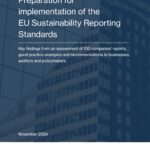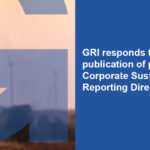
With a continued shift towards mandatory sustainability reporting, GRI is supporting global policymakers with an initial set of three new guidance documents. Covering double materiality, due diligence, and the Corporate Sustainability Reporting Directive (CSRD), each publication emphasizes the pertinence of the topic and the significant role played by the globally adopted GRI Standards in helping address them:
- Double materiality: The interconnectedness of a company’s impacts on society and the environment with its financial performance. GRI reporting prepares companies for double materiality, given impacts are the basis for determining associated financial risks and opportunities.
- Due diligence: How a business prevents, mitigates and accounts for its impacts. Due diligence is integrated into the GRI Standards, with reporting requirements that are aligned with authoritative intergovernmental instruments.
- CSRD: The benefits for policymakers in harmonizing their sustainability disclosure regulations with the EU. The GRI Standards are closely aligned with the new European Sustainability Reporting Standards (ESRS), with collaboration continuing to ensure they remain so in the future.
In effect since January 2023, the CSRD introduces mandatory sustainability reporting for around 50,000 European companies – while from 2024, non-EU companies listed in EU regulated markets must also report. These developments highlight the importance of achieving alignment between sustainability reporting policies set by different jurisdictions, as supported by interoperability with the GRI Standards.
Peter Paul van de Wijs, Chief Policy Officer at GRI, said: “As the momentum builds towards more transparency around corporate behavior, alongside demands for globally comparable data, GRI is seeking to address policymakers’ questions on how mandatory sustainability reporting can help them tackle challenges in their jurisdictions. Our new publications – the first in a new series – address critical themes related to effective corporate disclosure and signal the importance of policy alignment on a global scale. The GRI Standards are already widely used by major companies around the world and are ideally placed to facilitate robust reporting practices based on the principles of due diligence and double materiality. As demonstrated by our role as co-constructors with EFRAG of the ESRS, and collaboration with the ISSB, GRI is a catalyst for corporate transparency and accountability.”



